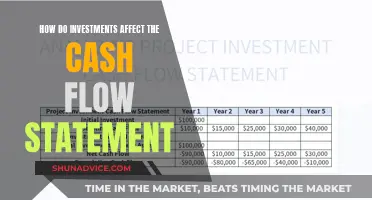
Deciding whether to use an investment broker or do it yourself is a complex question that depends on a variety of factors. Some people prefer to invest through their banks, as they are seen as safer and more secure than independent brokers. Banks can also provide a range of services, from investment accounts to financial advisors and tax withholding agents, making them a convenient one-stop shop for all financial needs. However, banks often charge higher fees and have limited investment options compared to independent brokers. On the other hand, independent brokers offer more affordable fees, greater investment flexibility, and a more dynamic user and trading experience. They also have access to a wider range of investment assets. When deciding whether to use an investment broker or do it yourself, it's important to consider factors such as investment goals, financial knowledge, and the level of involvement desired in managing one's portfolio.
What You'll Learn

Pros and cons of hiring an investment broker
There are several factors to consider when deciding whether to hire an investment broker or manage your investments yourself. Here are some pros and cons of hiring an investment broker:
Pros
- Expert management of your portfolio: A broker will have the knowledge and expertise to manage your portfolio professionally, taking into account your goals and cash needs.
- Peace of mind: Knowing that a professional is monitoring the market and your portfolio can give you peace of mind. They will make any necessary changes based on market fluctuations.
- Comprehensive financial planning: A broker can provide continuous financial advice and help you navigate complex financial situations. They can be a valuable partner in making informed investment decisions.
- Access to resources: Brokers often have access to market data, research tools, and other resources that can inform investment decisions.
- Time savings: Managing investments can be time-consuming, especially if you have multiple accounts or a diverse portfolio. A broker can save you time by handling the day-to-day management of your investments.
Cons
- Fees: One of the main drawbacks of hiring an investment broker is the cost. Brokers typically charge a fee, which can range from 1% or higher of the assets they manage. This can eat into your investment returns.
- Risk of substandard advice: While most brokers are skilled and ethical, there is always a risk of hiring a substandard broker who may not provide the best advice or adequately monitor your portfolio.
- Lack of control: When you hire a broker, you give up some control over your investment decisions. If you prefer to have a hands-on approach and make your own choices, hiring a broker may not be the best option.
- Potential for conflicts of interest: In some cases, brokers may have conflicts of interest, such as recommending certain investments that benefit them financially but may not be the best choice for you.
Ultimately, the decision to hire an investment broker depends on your individual circumstances, goals, and comfort level with managing your own investments.
Cash and Sweep Investment: Maximizing Your Money
You may want to see also

Pros and cons of managing your own investments
Managing your own investments can give you greater flexibility and control over your portfolio. You can make decisions about your investment strategy, asset allocation, and individual stocks, bonds, and funds to pick. However, it's important to note that moving from simply overseeing your investments to actively managing them is a significant change that requires expertise and time. Here are some pros and cons to consider:
Pros:
- More investment options: Self-directed plans offer access to a wider range of investments, including non-traditional assets like real estate, exchange-traded funds (ETFs), individual stocks and bonds, and more. This provides the potential for higher-quality investments and greater returns.
- Utilise your investing acumen: If you have investment knowledge and skills, managing your own investments allows you to put your experience to the test. You can make disciplined decisions during market volatility, potentially giving you an advantage over mutual funds managed by others.
- Non-traditional investment options: Self-directed investors can explore opportunities in real estate and other non-traditional investments, which may offer extraordinary earning potential.
Cons:
- Risk of messing up: With great power comes great responsibility. While having more options is a benefit, it also increases the risk of making poor investment decisions. Less experienced investors may overlook nuances that a professional manager would catch, potentially leading to losses.
- Time-consuming: Managing your own investments requires labour-intensive research and constant monitoring. It is a time-consuming process that demands discipline and a long-term perspective, especially during turbulent market conditions.
- Lack of liquidity and transparency: Some non-traditional investments may lack transparency and liquidity, making it challenging for investors accustomed to traditional stocks and bonds to buy and sell their positions easily.
- Fees and taxes: Self-directed investors may encounter unforeseen tax consequences and exorbitant fees, especially if they stray beyond mutual funds or trade stocks too frequently. It is crucial to understand the regulations and potential costs before making investment decisions.
Gains Subtraction from Investments: Understanding Cash Flow Impact
You may want to see also

Differences between banks and independent brokers
When deciding whether to use an investment broker or do it yourself, it is important to understand the differences between banks and independent brokers.
Many novice investors choose to invest through their banks, believing that financial institutions are more secure than independent brokers. Banks are often seen as a one-stop shop for all financial needs, from savings accounts to pensions and insurance. This makes it easier to consolidate all your financial activities into a single institution. Banks also provide research tools and information that an independent broker may not. They can also offer more personalised investment management, especially if you choose active investment funds.
However, banks tend to charge higher fees for their investment services. This is because they often use a subscription model, where customers pay a monthly fee to use their services, including investment services. On the other hand, independent brokers usually charge only on a transaction-based model. Banks also have a more limited selection of securities, funds, and options compared to independent brokers, who have access to a wider variety of investment assets.
Independent brokers, often referred to as discount or zero-commission brokers, allow you to trade stocks for very low or no fees. They also tend to have lower management costs for funds, giving you greater control over your money and assets. Trading with an independent broker is also efficient and time-saving, thanks to their innovative and speedy systems. They are also more likely to be up-to-date with new technology, such as paperless account opening.
The level of control and involvement is another key difference between banks and independent brokers. Most investors prefer to have high control over their portfolio without much involvement from the firm. Banks are not typically "hands-off" with their clients, as they actively manage your investments alongside other financial services you may be using. Independent brokers, on the other hand, focus more narrowly on investments and trading and tend to be more hands-off.
In summary, while banks may be a good choice for first-time investors due to their familiarity and range of services, independent brokers offer lower fees, more investment options, and greater control over your portfolio.
How Much Cash Should You Keep in Your Investment Portfolio?
You may want to see also

How to open a brokerage account
Opening a brokerage account is the first step towards investing. Brokerage accounts are typically used to build future financial security or invest for long-term goals. A brokerage account is an arrangement between you and a licensed brokerage firm. You can open an individual or joint account.
- Select a brokerage firm: You can choose between an online brokerage company or a managed brokerage account. An online brokerage company allows you to buy and sell investments through their website. A managed brokerage account provides investment management from a human investment advisor or a robo-advisor.
- Complete the application: You can typically complete the application online in under 15 minutes. You will need to provide personal, employment, and financial information, as well as select specific account features and create login credentials.
- Verify your identity: As part of the application process, you will need to verify your identity.
- Fund the account: Once your account is opened, you will need to fund it before you can start investing. You can transfer funds electronically from your bank account or another brokerage account. Some brokers may require you to verify the transaction by depositing a small sum into your bank account first.
- Start investing: After your brokerage account is funded, you can begin investing in stocks, bonds, mutual funds, or other financial products.
It's important to note that there are no contribution limits or early withdrawal penalties for brokerage accounts. However, there are tax implications for the profits from selling your investments within a brokerage account.
Additionally, most brokers don't require a minimum deposit to open an account, but you will need to fund the account before purchasing any investments.
Gann Square of Nine: A Guide for Investing.com Traders
You may want to see also

When to use multiple brokerage accounts
While a simplified approach to investing with just one brokerage account is generally recommended, there are several reasons why having multiple brokerage accounts may be beneficial.
Firstly, diversification is a key advantage of having multiple brokerage accounts. Just as diversifying your investment portfolio across different asset classes mitigates risk, holding accounts with multiple brokerage firms can provide a similar benefit. This ensures your assets are not concentrated in one place, reducing the potential impact of issues with a single broker, such as website crashes or outages.
Secondly, different brokers offer varying features, trading platforms, and tools. By maintaining accounts with multiple firms, you can access a broader range of quality features and choose the platforms and tools that align best with your preferences and trading style. For example, larger brokers like Fidelity, Charles Schwab, and E-Trade offer robust trading platforms, while mobile-first brokers like Robinhood and Public offer a more user-friendly mobile investing experience.
Thirdly, having multiple brokerage accounts can make your investing more cost-efficient. Different brokers have varying fee structures, and by holding accounts with multiple platforms, you can take advantage of low-cost options, commission-free trades, and signup bonuses. Additionally, some brokers may offer specialised services or excel in certain types of investments or asset classes that others don't provide.
However, it's important to consider the drawbacks of having multiple brokerage accounts. Managing multiple accounts can be more challenging and time-consuming, increasing the risk of errors and resulting in a fragmented view of your overall portfolio. It may also be more difficult to monitor your portfolio's performance and accurately assess your asset allocation and risk exposure.
Therefore, the decision to use multiple brokerage accounts should be aligned with your investment goals, preferences, and the specific benefits offered by each platform. If you're comfortable with the additional account maintenance, leveraging the benefits of different brokers can help maximise your investment strategy.
Unlocking Investment Opportunities with Cash-Out Refinancing
You may want to see also
Frequently asked questions
Using an investment broker can give you access to a wider range of investment options and classes, personalised services, and market data. They can also provide expert management of your portfolio, taking into account your goals and cash needs.
Managing your own investments can save you money on broker fees. You will also have the freedom to make your own decisions and will enjoy greater control over your money and assets.
There is a risk that your portfolio will not perform as well as that of a professional. You may also not allocate your funds appropriately, or make expensive mistakes such as paying high hidden fees or missing tax savings.







